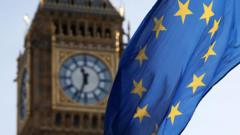With the UK and EU holding their first bilateral summit post-Brexit, the discussions reflect a need for collaboration amid global tensions involving Russia and China. While both parties show willingness to progress, underlying issues remain, particularly around trade, fishing rights, and defence contracts.
UK-EU Relations on the Brink of Transformation: First Summit Since Brexit

UK-EU Relations on the Brink of Transformation: First Summit Since Brexit
A critical UK-EU summit in London marks a potential shift in relations, as both sides grapple with geopolitical pressures and aim to solidify their partnership.
The UK and EU are set to engage in their first bilateral summit since Brexit, a significant moment that highlights shifting dynamics in their relationship. Scheduled for Monday in London, the summit presents a unique opportunity for both sides to address the complexities brought about by global events and the fallout of Brexit. Despite acknowledging past bitterness, officials indicate a collective desire to foster a strong partnership driven by urgent geopolitical concerns, including the war in Ukraine and confronting Russian aggression.
As the UK and EU leaders gear up for negotiations, they are compelled to work closely, reflecting the gravity of international security and economic instability. "Failure to do so, in the current international context, would not be a good look," stated Anand Menon, director of the think tank UK in a Changing Europe. France, historically more adversarial in these discussions, has expressed its support for improved relations, particularly as President Emmanuel Macron is set for a state visit to the UK in July, potentially softening pre-summit tensions.
At the summit, three significant announcements are expected: a joint declaration on international cooperation, a security and defence pact, and measures to alleviate trade barriers caused by Brexit. Prime Minister Keir Starmer aims to begin a "reset" with the EU, although the agreements may not substantially overhaul the economic landscape. Labour's cautious approach is influenced by electoral fears and the rising Eurosceptic Reform Party's popularity.
Key discussions will focus on a sector-by-sector strategy for reducing trade barriers, particularly pertaining to plant and animal health regulations, which aim to streamline exports and imports. However, the EU's insistence on adhering to future SPS rules and accepting oversight from the European Court of Justice poses challenges, especially for hardline Brexit proponents. Negotiations are also expected on fishing rights, with France and other nations demanding long-term agreements essential for talks.
Efforts to enhance mobility for professionals and musicians are on the agenda, including visa reductions and a proposed Youth Experience Scheme to facilitate student exchanges and work opportunities. However, Labour's commitment to reducing migration complicates these discussions, leading to potential battles over public perceptions and political backlash.
Defence cooperation remains a focal point, with calls for the UK to access EU rearmament contracts due to its leadership role in supporting Ukraine. However, France's tough stance on limiting non-EU firms from bidding complicates these negotiations, though other nations advocate for more inclusive agreements. The ongoing challenge lies in balancing national security needs against domestic economic concerns and striving for a collaborative defence industry that meets Europe’s intricate demands.
As both sides navigate these complex issues, the summit stands as a symbolic step towards mending relations post-Brexit, with the wider effects of these negotiations set to redefine UK-EU interactions for years to come.




















